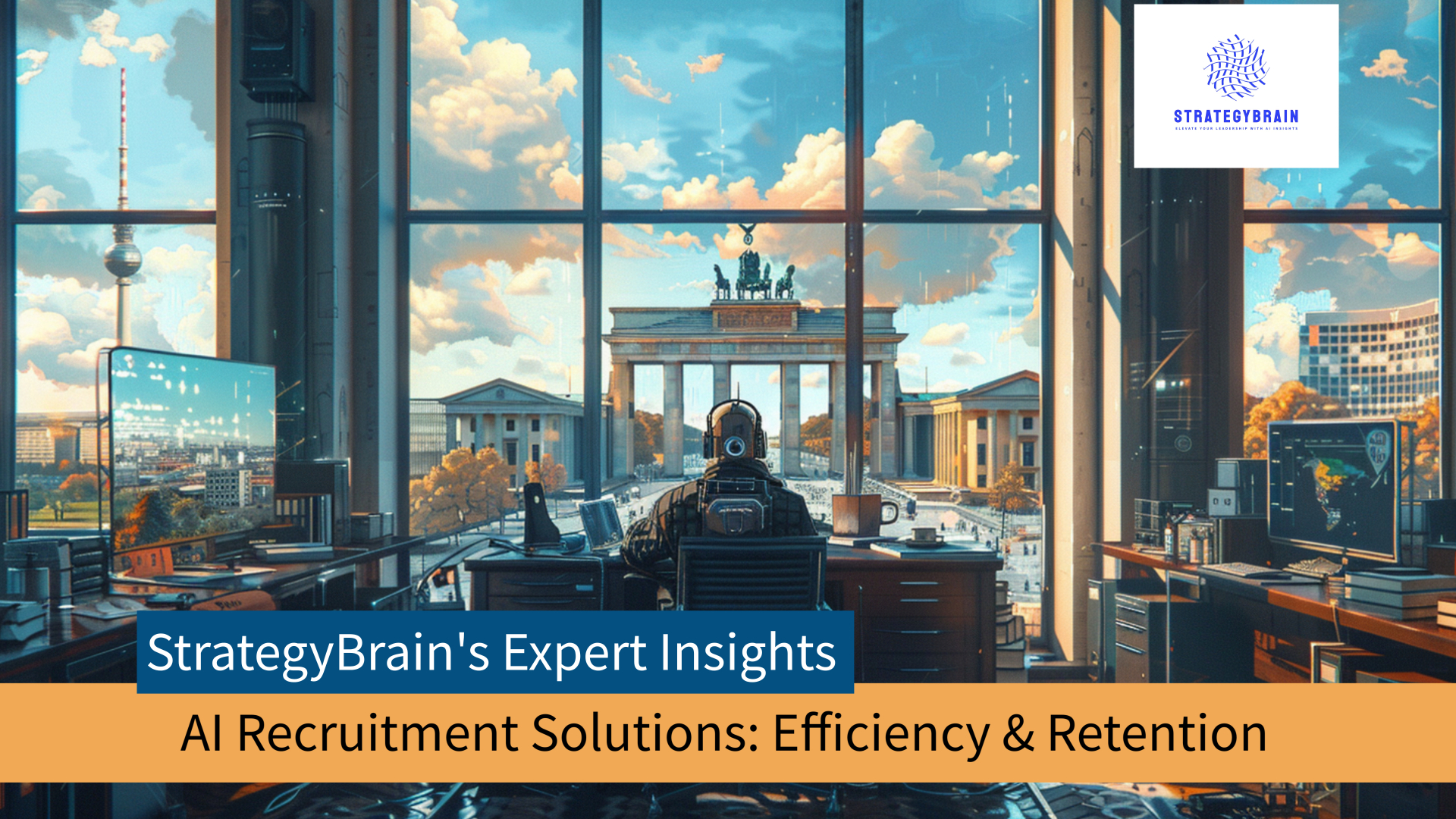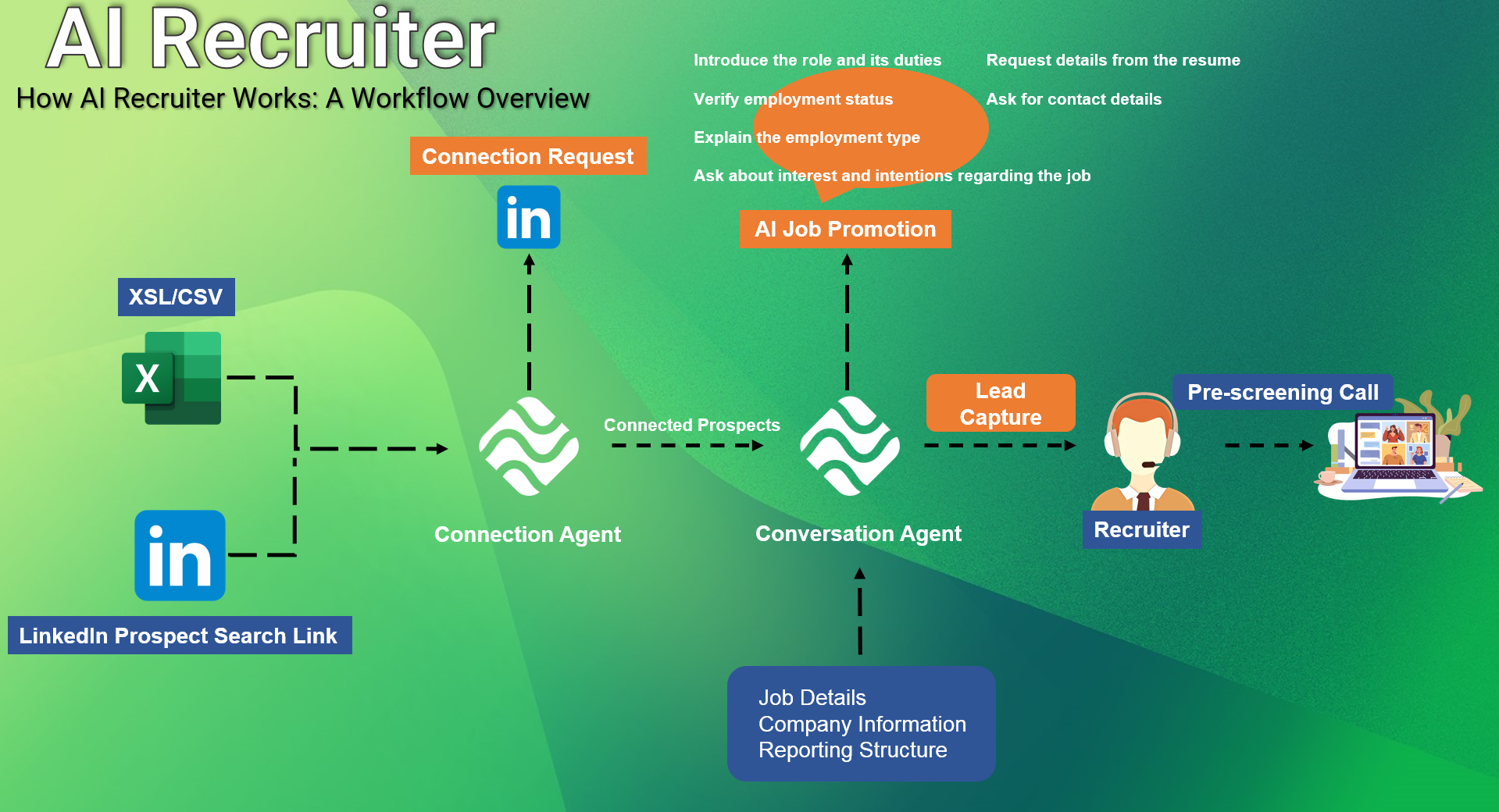The Adoption of AI technologies in recruitment
Everything is possible with AI – imagine an office without airport signage where paper forms stuck on a fridge are replaced by the interactive electronic hangout of AI technologies showcasing applicant profiles. This dream is now a reality; companies like Apple and Meta utilise virtual reality and artificial intelligence in their working environment dissipating intermediaries in recruitment. Thus, HR professionals should not only understand that AI technologies are not an abstract future concept but tools like chatGPT that have altered the process of recruitment and other areas.
AI-Driven Recruitment Solutions by Strategybrain
At Strategybrain, we have implemented our technologies to improve our recruitment efficiency by 40% with AI-powered candidate sourcing, screening, and matching. We make lifelong friends with our employees by contributing to million-dollar hiring business operations’ structuring and decision-making letting us relax and do nothing but make a decision to hire or not instead of thinking about recruitment complexities.
Predicting the number of potential hires
At Strategybrain, we also predict the future needs and, in the case, we tell a client we need one “IT Project Manager” by the end of the year; we prepare that talent pipeline with prediction and pre-build a talent pipeline.
Recognition on industry events because of our AI technologies designed explicitly to the recruitment market.
We reduced time-to-fill and improved the quality of hire ultimately. We have devised our proprietary AI technologies meticulously designed to suit the recruitment market. Our AI technologies have changed the recruitment methodologies and tactics. Our technologies received the appreciation by industry giants like Dave Ulrich and companies in industry forums.
AI affects every aspect of the recruitment process, from sourcing candidates to onboarding. AI-driven tools predominantly increase the accuracy of skills assessment and efficiency of the processes. At the same time, decision-makers are empowered to make data-driven decisions rather than rely on intuition or subjective judgment. For instance, a recruiter can partner with an AI-driven applicant tracking system to improve the recruitment process. The system will analyze both a resume and a job description to provide a detailed insight into which skills, experiences, and qualifications are shown to meet the requirements of the job description. In this way, a recruiter will ignore irrelevant data and concentrate on the best candidates.
Upskilling HR with AI in Recruitment
Strategic Upskilling
AI and the growing trend of automation create new job role tasks. In response, strategic upskilling is the key, especially since the World Economic Forum reports that 1.1 billion jobs will be altered due to technological change. Moreover, by 2025, half of all workers will require reskilling. Thus, upskilling HR prepares them for emerging challenges in recruitment, employee management, and policy implementation in the era of AI and big data.
Training and Development Opportunities
- Micro-certification Programs: Establish micro-certification programs in partnership with online learning platforms. Focus on specialized courses like data analysis for recruitment, predictive analytics for employee retention, and AI-based onboarding strategies.
- Internal AI Workshops: HR specialists will benefit from internal workshops where they can learn how to use machine learning tools on real examples. Internal expert trainers can provide workshops specifically designed for HR professionals to enable them to learn how to use AI in talent management.
- Personalized Learning Pathways: Develop an HR application or an online portal with personalized learning pathways. Some AI mentors could develop a test that identifies knowledge gaps and then suggested training in the following AI modules specifically for HR.
- Executive Training: Develop a one-day seminar concentrated on AI ethics, AI strategies, and AI data management for executives. The aim is for HR executives to be able to understand the strategic implications of AI in terms of workforce planning, hiring for diversity, and employee development.
AI for Talent Acquisition: Practical Examples
Resume Screening and Shortlisting
AI-based systems can screen and shortlist resumes automatically.The system will match the description of job requirements with the skills shown in a resume using natural language processing technology.
Candidate Sourcing and Engagement on AI
AI technology plays a critical role in enhancing the recruitment process. One of the major ways through which AI contributes to the recruitment process is through creating an enhanced experience with candidate sourcing. In this case, AI conducts candidate search and is capable of predicting whether the candidate is interested to get a job using data from inference of its profile announced on products like LinkedIn based on interactions with other profiles. This creates an efficient process for sourcing candidates quickly and accurately. Ensuring Trust in AI Recruitment
One of the important aspects of AI-assisted recruitment is that it has to remain personal. While AI can serve many functions, it can only be used as assistance to human recruiters who can put data contextually and give context to data. Besides, the use of AI in recruitment raises many ethical considerations that need to be addressed by HR specialists in order to ensure that the use of AI is trusted. These include challenges such as preventing biases in AI algorithms. In addition, data security and privacy are major concerns that can affect recruitment.
Looking to the Future
The major trends in using AI when it comes to talent acquisition and recruitment are influenced by particular trends indicating the vigilant and virtual future of post-pandemic business. The development in the future will be guided by the global trends of work in both digital and remote settings. AI will be used to assist in managing distributed teams, virtual reality training, and employee experience developed on a large scale.
Conclusion and Call to Action
AI is a critical part of creating a competitive and effective business process in terms of efficiency, data and resources management. AI usage in HR is not a part of some abstract future – it is a necessity for tomorrow and today that requires HR professionals to be ready for the future. No business can afford to lag behind in using AI with the new advanced tools. Feel like it is time to start working with AI in your recruitment process? Find out about Strategybrain’s AI-recruitment solutions and transform your process of employee selection.
Q&A for HR Beginners
Q1: What is AI in recruitment?
A1: AI in recruitment refers to the use of artificial intelligence technologies to automate and enhance various aspects of the hiring process, including candidate sourcing, screening, and matching.
Q2: How can AI improve the recruitment process?
A2: AI can improve recruitment by increasing efficiency, accuracy, and consistency in evaluating candidates, reducing the time-to-hire, and enabling data-driven decision-making.
Q3: What skills do HR professionals need to leverage AI effectively?
A3: HR professionals need skills in data analysis, machine learning, and an understanding of AI ethics and data privacy to leverage AI effectively in recruitment.
Q4: How can HR professionals upskill in AI?
A4: HR professionals can upskill in AI through micro-certification programs, internal AI workshops, personalized learning pathways, and executive-level seminars.
Q5: What are the ethical considerations in AI recruitment?
A5: Ethical considerations in AI recruitment include avoiding biases in AI algorithms, ensuring data privacy and security, and maintaining a personal touch in candidate interactions.

